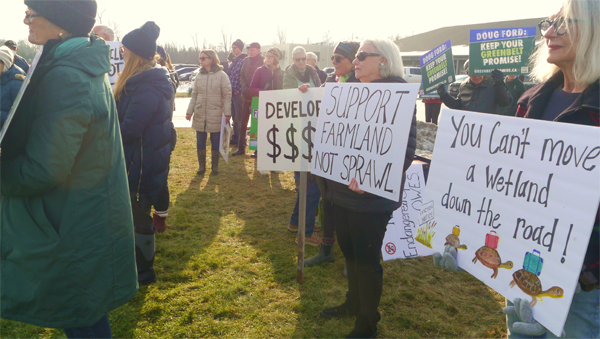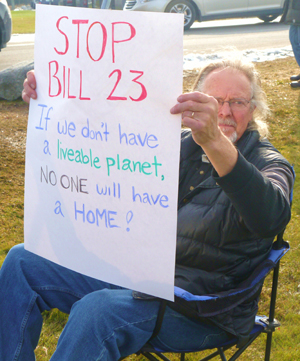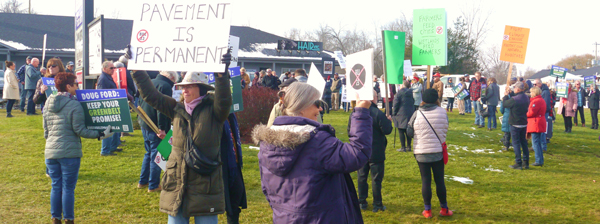Prince Edward County environmental groups and friends protest Bill 23
Administrator | Nov 24, 2022 | Comments 0

By Sharon Harrison
Protesters at MPP Todd Smith’s office Thursday let him, the Ford government and the public know that farmland, wetlands and greenbelt – the things that make Prince Edward County naturally unique – could all be in jeopardy if the provincial government gets its way and goes ahead with the ‘More Homes Built Faster’ Act.
The event saw a big turnout with a couple of hundred people peacefully protesting on an unseasonably warm and sunny morning at Rossmore Plaza against the act, also known as Bill 23. Bill 23 was submitted for third reading Wednesday and has not yet been signed into law.
Organized by the Prince Edward County Field Naturalists (PECFN), a number of environment groups participated, feeling strongly, that if passed, the bill will have serious consequences for residents, the municipality, life in the County, as well as its precious natural and cultural heritage.
It was noted that many others are fighting this bill, including the Association of Municipalities of Ontario, the Ontario Farmland Trust, the Ontario Federation of Agriculture, Architectural Conservancy of Ontario, the Green Party of Ontario, the NDP, as well as many planners.
“This is really a problematic bill,” said Amy Bodman, PECFN president, who said PECFN has a big interest in protecting natural habitat and conserving it.
 The Bay of Quinte area, which includes Prince Edward County, has 100 provincially-significant wetlands throughout the watershed.
The Bay of Quinte area, which includes Prince Edward County, has 100 provincially-significant wetlands throughout the watershed.
“Changes to the wetland evaluation system would mean there would only be one provincially-significant wetland remaining, representing a 99 per cent loss to Quinte region’s wetlands,” noted Bodman. “The proposed changes are not scientifically-based and will devalue the wetlands we desperately need to protect.”
An open mic for the duration was available to those who wished to share a personal story or just express a few words of what is wrong will Bill 23, where many took advantage of the opportunity.
People spoke to eco-systems and wetlands, the importance of taking care of watersheds, impacts on wildlife, loss of farmland, sharing personal stories, favourite natural hang-outs, and voicing grave concern around Bill 23 generally.
 Some also touched on the many years spent of looking after the natural environment only to potentially lose all the good work, protection and legislation accomplished by so many individuals and groups, if the bill were to proceed.
Some also touched on the many years spent of looking after the natural environment only to potentially lose all the good work, protection and legislation accomplished by so many individuals and groups, if the bill were to proceed.
Two petitions and several letters were available for those wanting to add their signature, and others stepped inside Smith’s office to voice and register opinion.
If passed, the bill will, among other things, allow the province to amend the Prince Edward County’s Official Plans, remove the public’s right to appeal development decisions, and remove the provincial policy statement’s protection of farmland and natural heritage.
It will also strip the province’s Conservation Authorities of the power to protect the watershed in their area.
 Surrounded by water, the County is susceptible to storm surges, but it was also noted that currently, and historically, the County has the lowest precipitation (between May to August) in all of Ontario, and has been identified as a highly vulnerable aquifer.
Surrounded by water, the County is susceptible to storm surges, but it was also noted that currently, and historically, the County has the lowest precipitation (between May to August) in all of Ontario, and has been identified as a highly vulnerable aquifer.
Bodman noted the two main industries, tourism and agriculture, need water the most, and explained the significant role wetlands play.
“Our drinking water is at risk and highly susceptive to contamination from development and industry,” she said. “Our wetlands are our best protection as they get water into our aquifers while filtering out its contaminants.”
She explained how the inland provincially-significant wetlands, and other wetlands, pull water into the ground, so it’s there when needed.
“Our few remaining provincially-significant coastal wetlands protect our highly-vulnerable shorelines during storm surges,” she explained. “Our wetlands play a huge role in flood prevention, drought mitigation and erosion control.“
She said wetlands also store an enormous amount of carbon.
Bodman said by changing the OWES (Ontario Wetland Evaluation System) classification system, existing provincially-significant wetlands could lose their status and protections.
As well, unevaluated wetlands are unlikely to meet the standard for additional protection without the points of species-at-risk, so there won’t be any new provincially-significant wetlands designated, she said.
John Hirsch, South Shore Joint Initiative President said up until now, “Todd Smith has been our friend from an environmental standpoint.
“He helped us with the turtles, he was very supportive of our efforts to create the conservation reserve (which is about to happen on the South Shore), but now things have turned 180 degrees.”
 This bill is supposedly to support the creation of affordable housing, Hirsch said.
This bill is supposedly to support the creation of affordable housing, Hirsch said.
Bill 23 is to create an off-setting system to allow developers to destroy wetlands, woodlands and other wildlife habitats, as long as they pay into a fund.
“Building in wetlands through the off-set procedure to be developed; that’s not going to be affordable housing either because this is highly desirable property and developers are going to build million dollar homes on them, not affordable homes.”
Hirsch outlined how wetland off-setting works by explaining how if a developer wants to develop a piece of wetland (noting the County has a lot of long-term, very biologically diverse wetlands, and coastal wetlands), an offset proposal says they can take a piece of field, dig a big hole and fill it with water, and that constitutes an offset.
“What’s the biological value of a hole filled with water? I think that’s just called a pond. None of these efforts will create affordable housing.”
Jane Lesslie, chair of the former PEC Environmental Advisory Committee said Bill 23 is a move backward.
“If I told you the province is going to tear down our water filtration plants to build housing, you would think that was stupid, right?
“If I told you the province was going to tear down a breakwater against flooding to build homes, you would say that was idiotic. If I told you the province was going to build houses but we couldn’t recharge our already threatened groundwater as a consequence, you would say that was nuts. And, if I told you that homeowners were going to have new homes, but were unable to get insurance on them because their homes were flooded all the time, you would say well, that’s useless, but that’s exactly what Bill 23 does.”
She said tearing down the greenbelt tears apart the County’s green assets.
“We will no longer be able to protect our wetlands, and those risks are rising in intensity and in frequency, thanks to climate change.
She said, this is not only the wrong legislation; it is the wrong legislation at the wrong time.
“If you care about climate change, and you care about your wallet, tell Todd Smith and Doug Ford to leave our greenbelt assets alone and say no to Bill 23.”
Bordering Highway 62, many vehicles travelling the highway honked their horns in support of the highly visible protestors, with some of the big rigs making the most impressive and loudest noise, much to the delight of the many placard-wielding protestors.
Jane Thompson said she wanted to speak on behalf of the children because they can’t speak for themselves.
“What we are doing today is really on their behalf, and for the next generation.”
Picton councillor Kate MacNaughton, said as an elected official, her top two concerns are housing and the environment.
“The bill we are looking at and all of its components doesn’t do what our community needs in either of those two things, and it does so much to push against our efforts as a council, and as a municipality, to move both of those forward.”
She said she wanted to see the province start working with small communities and rural communities, and communities with serious housing needs that are already so huge for such a small population base to grapple with.
MacNaughton said she would ask the province instead to give municipalities more power to undertake what is needed, not take power away.
I feel like they are taking our power as a community, our power as a municipality, and our ability to invest in environmental protection and climate change efforts away from us, and while they are at it, they are going to raise our taxes.”
Lori Borthwick, president of the Bay of Quinte Green Party of Ontario said the party is also upset about Bill 23, “which would be devastating to the province”.
“We want our voices to be heard and we want our MPP to represent us and our needs and the needs of our natural spaces.”
“We have lots of developable land for affordable housing right within city limits, and that’s what we should be developing,” she said. “We cannot afford to give up our farmland or our wetlands, and our green spaces; we need to leave some space for nature.”
President of the Prince Edward Federation of Agriculture, John Thompson, noted he was just back from an Ontario annual meeting and convention in London.
“The feelings against Bill 23 were very strong. There are too many problems with this opening up the green belt, reducing protections for prime farmland and so on,” he said.
Bodman noted how wetlands are the best defence against climate change and are an important economic driver, and pointed out the wetlands do all their work for free.
“They are extremely beautiful and provide habitat for our exceptional biodiversity, and the loss of wetlands will impact wildlife climate change, water quality and quantity, tourism, and recreation,” Bodman said.
She also noted that a loss of wetlands will result in the need for more infrastructure through the creation of storm water ponds, which will require more maintenance and monitoring, necessitating the need to increase municipal taxes, negatively impact the wetlands to offset flooding.
She stressed too that all of these changes do not only apply to housing, they also apply to commercial and industrial development.
“It’s the attack on our democracy that we will no longer be informed of developments coming along, and we won’t have the right to take them on appeal to the Ontario Land Tribunal. We will no longer have those rights,” added Borthwick.

At the last meeting of the former council Nov. 8, two resolutions were unanimously passed rejecting the province’s Bill 23 proposal. (See that story here: https://www.countylive.ca/council-opposes-proposed-sweeping-provincial-powers/
Bill 23 can be found at https://www.ola.org/en/legislative-business/bills/parliament-43/session-1/bill-23
Information can also be found on the Environmental Registry of Ontario website where comments from the public can be submitted up until Dec. 9 at https://ero.ontario.ca/
Nature Canada’s NatureBus will be in Picton on Monday, Dec. 5 (afternoon) in the parking lot of Giant Tiger to collect messages calling on world leaders to halt and reverse nature loss. The messages will be delivered to Prime Minister Justin Trudeau at NatureCOP, the UN biodiversity conference in Montreal which takes place Dec. 9-17.
Filed Under: Featured Articles • Local News
About the Author:
































